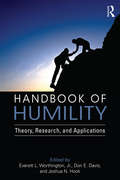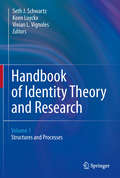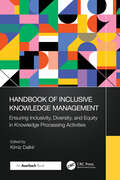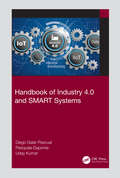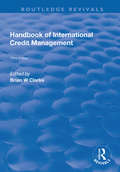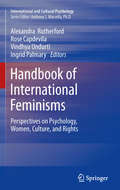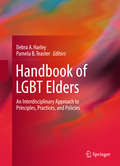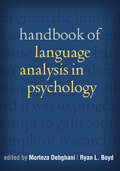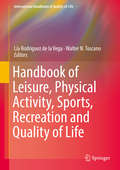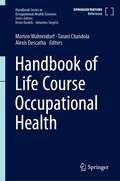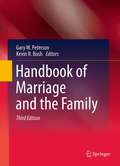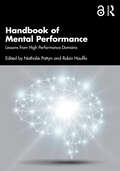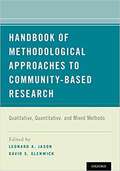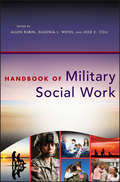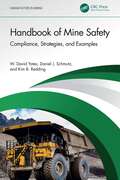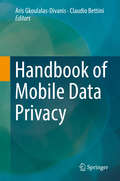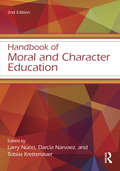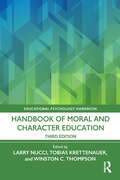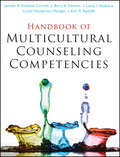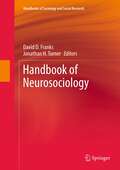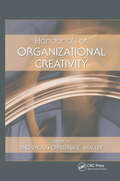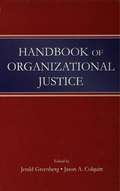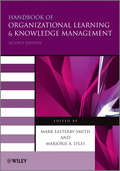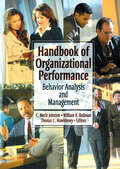- Table View
- List View
Handbook of Humility: Theory, Research, and Applications
by Everett L. Worthington Jr. Joshua N. Hook Don E. DavisThe Handbook of Humility is the first scholarly book to bring together authors from psychology as well as other fields to address what we know and don’t know about humility. Authors review the existing research in this burgeoning field that has well over 100 empirical articles and an increasing trajectory of publication. This work should form the basis for research in humility for many years. In this book, chapters address definitions of humility that guide research. Authors also reflect on the practical applications of humility research within the areas they reviewed. The book informs people who study humility scientifically, but it is also an exceptional guide for psychotherapists, philosophers, religious and community leaders, politicians, educated lay people, and those who would like to fuel an informed reflection on how humility might make interactions more civil in relationships, organizations, communities, political processes, and national and international relations.
Handbook of Identity Theory and Research
by Vivian L. Vignoles Koen Luyckx Seth J. SchwartzIdentity is one of the most extensively studied constructs in the social sciences. Yet, despite the wealth of findings across many disciplines, identity researchers remain divided over such enduring fundamental questions as: What exactly is identity, and how do identity processes function? Do people have a single identity or multiple identities? Is identity individually or collectively oriented? Personally or socially constructed? Stable or constantly in flux? The Handbook of Identity Theory and Research offers the rare opportunity to address the questions and reconcile these seeming contradictions, bringing unity and clarity to a diverse and fragmented literature. This exhaustive reference work emphasizes the depth and complexity of identity processes and domains and presents perspectives from many different theoretical schools and empirical approaches. Contributing authors provide perspectives from psychology (e.g., narrative, social identity theory, neo-Eriksonian) and from other disciplines (e.g., sociology, political science, ethnic studies); and the editors highlight the links between chapters that provide complementary insights on related subjects. In addition to covering identity processes and categories that are well-known to the field, the Handbook tackles many emerging issues, including: - Identity development among adopted persons. - Identity processes in interpersonal relationships. - Effects of globalization on cultural identity. - Transgender experience and identity. - Consumer identity and shopping behavior. - Social identity processes in xenophobia and genocide. The Handbook of Identity Theory and Research lends itself to a wealth of uses by scholars, clinicians, and graduate students across many disciplines, including social, developmental, and child/school psychology; human development and family studies; sociology; cultural anthropology; gender, ethnic, and communication studies; education; and counseling.
Handbook of Inclusive Knowledge Management: Ensuring Inclusivity, Diversity, and Equity in Knowledge Processing Activities
by Kimiz DalkirHandbook of Inclusive Knowledge Management: Ensuring Inclusivity, Diversity, and Equity in Knowledge Processing Activities examines the role that diversity, equity and inclusivity (DEI) plays in the field and discipline of knowledge management (KM). With the premise that DEI is the inclusion and equal treatment of all types of people, things and viewpoints, the book aims to increase awareness of DEI among KM practitioners and researchers. It is a starting point for adopting knowledge processing activities that ensure all knowledge voices are represented in knowledge creation and capture. The book explains how this valuable knowledge can be shared and disseminated so that there is equitable access as well as knowledge. The focus of this handbook is on inclusivity in KM, its current state, specific challenges and an exploration of the best path forward.Currently, inclusivity does not appear to be on many KM road maps, and this book provides insights into the state-of-the-art of inclusivity in KM. In alignment with the book’s central theme, it presents a diverse range of perspectives that includes KM researchers, KM educators and KM practitioners. Addressing different stages of knowledge processing, as well as the KM bookends of KM culture, KM competencies and KM governance, the book features in-depth case studies to illustrate how inclusivity can be integrated into KM. The handbook concludes with concrete recommendations on how to integrate inclusivity into KM in organizations. Reviewing both the theory and practice of inclusive KM, the book helps readers gain actionable insights into an inclusive KM approach that includes standards, guidelines and checklists.
Handbook of Industry 4.0 and SMART Systems
by Uday Kumar Diego Galar Pascual Pasquale DaponteIndustry 4.0 refers to fourth generation of industrial activity characterized by smart systems and internet-based solutions. This book describes the fourth revolution based on instrumented, interconnected and intelligent assets. The different book chapters provide a perspective on technologies and methodologies developed and deployed leading to this concept. With an aim to increase performance, productivity and flexibility, major application area of maintenance through smart system has been discussed in detail. Applicability of 4.0 in transportation, energy and infrastructure is explored, with effects on technology, organisation and operations from a systems perspective.
Handbook of International Credit Management (Routledge Revivals)
by Brian W ClarkeThis title was first published in 2001. This volume covers all aspects of export credit management as well as the management of overseas subsidiary companies' credit operations through a series of inter-linked chapters written by 25 experts in the international field. This third edition has been completely revised and, in substantial parts, re-written to reflect the development and availability of the modern tools now at the disposal of the international credit manager, especially in the area of information technology. New chapters have been added on bank risk and international bankruptcy law to respond to the growing interest in these areas. The objectives of the handbook are to provide a complete operating guide and training reference for the application of the financial and control techniques necessary for international credit management and to describe the tools available for all the processes from initial policy-making through to final collection of trade debts.
Handbook of International Feminisms
by Rose Capdevila Ingrid Palmary Alexandra Rutherford Vindhya UndurtiThe goal of Handbook of International Perspectives on Feminism is to present the histories, status, and contours of feminist research and practice in their respective regional and/or national contexts. The editors have invited researchers who are doing this work to present their perspectives on women, culture, and rights with the objective to illuminate the diverse forms that feminist psychological work takes around the world, and connect these forms with the unique positions and concerns of women in these regions. What does "feminist psychology" look like in Japan? In South Africa? In Sri Lanka? In Canada? In Brazil? How did it come to look this way? How do psychologists in these countries or regions, each with unique political, economic, and cultural histories, engage in feminist work in the societies in which they live? How do they employ the tools of "psychology" - broadly defined - to do this work, and what tensions and challenges have they faced?
Handbook of LGBT Elders
by Debra A. Harley Pamela B. TeasterThis groundbreaking resource presents a wealth of findings and perspectives previously unseen in the LGBT literature. Its focus on psychological, sociopolitical and care delivery issues affecting LGBT elders reveals both the nuanced interplay between diverse sources of identity and multiple sources of stigma and discrimination. Specific chapters highlight challenges and resiliencies impacting subpopulations (e. g. , racial groups, veterans, immigrants), examine employment and advocacy issues, discuss later-life concerns in context and offer guidelines for relevant, ethical practice. Contributors represent a wide range of fields from psychiatry and gerontology to public health and public policy, reflecting the scope and needs of this diverse and complex population. Among the topics in the Handbook: Family relationships of older LGBT adults. The intersection of identities: race, age, sexuality and care network. Bisexuality: an invisible community among LGBT elders. Implications of the Supreme Court ruling on same-sex marriage. No money, no work and you're old. Disabilities among LGBT elders: responses of medicine, public health, rehabilitation and social work. Handbook of LGBT Elders is an essential reference for mental health professionals, psychologists and social workers who work with the LGBT community and the elderly, as well as researchers interested in the LGBT community and aging.
Handbook of Language Analysis in Psychology
by Morteza Dehghani and Ryan L. BoydRecent years have seen an explosion of interest in the use of computerized text analysis methods to address basic psychological questions. This comprehensive handbook brings together leading language analysis scholars to present foundational concepts and methods for investigating human thought, feeling, and behavior using language. Contributors work toward integrating psychological science and theory with natural language processing (NLP) and machine learning. Ethical issues in working with natural language datasets are discussed in depth. The volume showcases NLP-driven techniques and applications in areas including interpersonal relationships, personality, morality, deception, social biases, political psychology, psychopathology, and public health.
Handbook of Leisure, Physical Activity, Sports, Recreation and Quality of Life (International Handbooks Of Quality-of-life Ser.)
by Lía Rodriguez de la Vega Walter N. ToscanoThis handbook provides an overview and synthesis of relevant literature related to leisure and recreation, and physical activity and its relationship to quality of life. Divided into two parts, the text presents the analysis of leisure and recreation studies and physical activities and sports, with diverse populations. The first part deals with leisure and recreation in relation to quality of life, with different perspectives on different age groups, ethnic groups, the approach of an Integrated Model of Leisure Well-being focusing on how leisure activities contribute to leisure well-being etc. The second part deals with physical activities and sports in relation to quality of life, discussing the consideration that "exercise is good for you", associating physical exercise with other conditions of life in society, its impact on people with disabilities, etc. It is of interest to researchers and students, legislators, educators, providers of leisure services.
Handbook of Life Course Occupational Health (Handbook Series in Occupational Health Sciences)
by Morten Wahrendorf Tarani Chandola Alexis DescathaThis handbook provides a comprehensive overview of recent developments in research on the relationship between occupational trajectories over the life course and health. It uncovers the impact of far-reaching changes of work and employment, as evidenced by increased flexibility, discontinuity, and technological innovation, and offers insights into recent theoretical and methodological developments addressing this challenge. In its main parts, it presents the best evidence to readers about the following topics: early life influences on (un)healthy work, chronic exposure to occupational risks; nonstandard employment and poor health; work continuation with chronic disease; occupational determinants of healthy aging. In its final part, it discusses policy implications of current knowledge and points to the need of developing new solutions in research and practice, not least in times of climate crisis and the new pandemic.The important handbook has been prepared by a distinguished editorial team, with chapters written by prominent international experts. Despite its continuous reference to scientific knowledge it addresses its content to a broader, non-specialized readership.
Handbook of Marriage and the Family
by Gary W. Peterson Kevin R. BushThe third edition of Handbook of Marriage and the Family describes, analyzes, synthesizes, and critiques the current research and theory about family relationships, family structural variations, and the role of families in society. This updated Handbook provides the most comprehensive state-of-the art assessment of the existing knowledge of family life, with particular attention to variations due to gender, socioeconomic, race, ethnic, cultural, and life-style diversity. The Handbook also aims to provide the best synthesis of our existing scholarship on families that will be a primary source for scholars and professionals but also serve as the primary graduate text for graduate courses on family relationships and the roles of families in society. In addition, the involvement of chapter authors from a variety of fields including family psychology, family sociology, child development, family studies, public health, and family therapy, gives the Handbook a multidisciplinary and interdisciplinary framework.
Handbook of Mental Performance: Lessons from High Performance Domains
by Nathalie Pattyn Robin HauffaThis extensive overview of mental performance optimization techniques offers both a state-of-the-art reference resource and comprehensive tool for those engaged in the management and implementation of mental performance programs.The book is written by a combination of academic and operational experts from a wide range of high-performance domains, including the military, space programs, academia, executive coaching, and elite athlete coaching, who complement scientific analyses and overviews of current knowledge with their own experience. Divided into three parts, the book begins by providing a broad conceptual framework through which to embed the latter technical content. Part two looks specifically at the interventions, knowledge, skills, and techniques needed to improve mental performance for both individuals and teams. The final section pulls together the theory of the previous parts, taking a more practical approach by covering implementation, methodological plans on how to appraise new techniques, lessons learned based on the practical experience of the authors, and considerations regarding the necessary learning environment for mental performance improvement.Pairing an overview of all available neurological, cognitive, and psychological interventions aimed at improving mental performance with a review of their implementation, this is a go-to guide for practitioners involved in managing mental performance and program managers looking at the implementation of a mental performance policy across a wide range of domains. It will also be of interest for courses on performance psychology and human performance in both an academic and professional environment.The Open Access version of this book, available at http://www.taylorfrancis.com, has been made available under a Creative Commons Attribution-Non Commercial-No Derivatives (CC-BY-NC-ND) 4.0 license.
Handbook of Methodological Approaches to Community-Based Research: Qualitative, Quantitative, and Mixed Methods
by Leonard A. Jason David S. GlenwickThe field of community psychology has focused on individuals' and groups' behavior in interaction with their social contexts, with an emphasis on prevention, early intervention, wellness promotion, and competency development. Over the past few decades, however, community-based applications of the newest research methodologies have not kept pace with the development of theory and methodology with regard to multilevel data collection and analysis. <p><p> The Handbook of Methodological Approaches to Community-Based Research is intended to aid the community-oriented researcher in learning about and applying cutting-edge quantitative, qualitative, and mixed methods approaches. The Handbook presents a number of innovative methodologies relevant to community-based research, illustrating their applicability to specific social problems and projects. <p><p> These methodological approaches explore individuals and groups in interaction with their communities and provide examples of how to implement and evaluate interventions conducted at the community level. The chapters discuss how particular methodologies can be used to help gather and analyze data dealing with community-based issues. Furthermore, they illustrate the benefits that occur when community theorists, interventionists, and methodologists work together to better understand complicated person-environment systems and the change processes within communities.
Handbook of Military Social Work
by Allen Rubin Eugenia L. Weiss Jose E. CollThe need has never been more crucial for community health providers, programs, and organizations to have access to training in addressing the unique behavioral health challenges facing our veterans, active duty military, and their families. Handbook of Military Social Work is edited by renowned leaders in the field, with contributions from social work professionals drawing from their wealth of experience working with veterans, active duty military, and their families. Handbook of Military Social Work considers: Military culture and diversity Women in the military Posttraumatic stress disorder in veterans Traumatic brain injury in the military Suicide in the military Homelessness among veterans Cycles of deployment and family well-being Grief, loss, and bereavement in military families Interventions for military children and youth Offering thoughtful advice covering the spectrum of issues encountered by mental health professionals working with individuals and families, Handbook of Military Social Work will contribute to the improvement of efforts to help our military personnel, veterans, and their families deal with the challenges they face.
Handbook of Mine Safety: Compliance, Strategies, and Examples (Human Factors in Mining)
by W. David Yates Daniel J. Schmutz Kim B. ReddingThe field of mining safety is rapidly evolving and staying abreast of regulations and standards is crucial for any mining professional. However, with a growing scarcity of seasoned professionals, the industry faces a pressing need for comprehensive resources.Addressing this gap, the Handbook of Mine Safety: Compliance, Strategies, and Examples provides essential guidance for practitioners. From navigating complex hazards to interpreting evolving standards, this handbook offers indispensable insights tailored to the unique challenges of the mining sector. Inside the book, readers will find a wealth of practical information aimed at enhancing safety protocols and compliance. Beyond theoretical discussion, this handbook offers practical and actionable strategies and real-world examples to aid in the implementation of safety measures. From legal requirements to corrective measures, each chapter is written by an expert in the field and has been crafted to equip professionals with the tools they need to navigate the complexities of mining safety effectively. This will be the only guide the professional will need to gain a full understanding of all facets of safety in the mining industry.This handbook is a must-have resource for professionals in the fields of Occupational Health and Safety, Mining Engineering, Safety Engineering and Fire Safety. Whether you're a seasoned practitioner seeking to deepen your understanding or a newcomer looking to establish a solid foundation in mining safety, this book offers invaluable theory and practical guidance to enhance safety practices and mitigate risks in the dynamic world of mining operations.
Handbook of Mobile Data Privacy
by Aris Gkoulalas-Divanis Claudio BettiniThis handbook covers the fundamental principles and theory, and the state-of-the-art research, systems and applications, in the area of mobility data privacy. It is primarily addressed to computer science and statistics researchers and educators, who are interested in topics related to mobility privacy. This handbook will also be valuable to industry developers, as it explains the state-of-the-art algorithms for offering privacy. By discussing a wide range of privacy techniques, providing in-depth coverage of the most important ones, and highlighting promising avenues for future research, this handbook also aims at attracting computer science and statistics students to this interesting field of research. The advances in mobile devices and positioning technologies, together with the progress in spatiotemporal database research, have made possible the tracking of mobile devices (and their human companions) at very high accuracy, while supporting the efficient storage of mobility data in data warehouses, which this handbook illustrates. This has provided the means to collect, store and process mobility data of an unprecedented quantity, quality and timeliness. As ubiquitous computing pervades our society, user mobility data represents a very useful but also extremely sensitive source of information. On one hand, the movement traces that are left behind by the mobile devices of the users can be very useful in a wide spectrum of applications such as urban planning, traffic engineering, and environmental pollution management. On the other hand, the disclosure of mobility data to third parties may severely jeopardize the privacy of the users whose movement is recorded, leading to abuse scenarios such as user tailing and profiling. A significant amount of research work has been conducted in the last 15 years in the area of mobility data privacy and important research directions, such as privacy-preserving mobility data management, privacy in location sensing technologies and location-based services, privacy in vehicular communication networks, privacy in location-based social networks, privacy in participatory sensing systems which this handbook addresses.. This handbook also identifies important privacy gaps in the use of mobility data and has resulted to the adoption of international laws for location privacy protection (e.g., in EU, US, Canada, Australia, New Zealand, Japan, Singapore), as well as to a large number of interesting technologies for privacy-protecting mobility data, some of which have been made available through open-source systems and featured in real-world applications.
Handbook of Moral and Character Education (Educational Psychology Handbook)
by Darcia Narvaez Larry Nucci Tobias KrettenauerThere is widespread agreement that schools should contribute to the moral development and character formation of their students. In fact, 80% of US states currently have mandates regarding character education. However, the pervasiveness of the support for moral and character education masks a high degree of controversy surrounding its meaning and methods. The purpose of this handbook is to supplant the prevalent ideological rhetoric of the field with a comprehensive, research-oriented volume that both describes the extensive changes that have occurred over the last fifteen years and points forward to the future. Now in its second edition, this book includes the latest applications of developmental and cognitive psychology to moral and character education from preschool to college settings, and much more.
Handbook of Moral and Character Education (Educational Psychology Handbook)
by Larry Nucci Tobias Krettenauer Winston C. ThompsonThe Handbook of Moral and Character Education offers a definitive, state-of-the-art synthesis of leading scholarship in moral and character education. A subject of international interest and the focus of numerous governmental curricular mandates, the moral development and character formation of students are increasingly recognized as an essential component of a well-rounded schooling experience. This comprehensive volume explores the philosophical, psychological, and educational issues that define the field; links robust theoretical and empirical foundations to effective classroom practice; highlights implications for civic engagement and social justice; and follows the lessons learned from moral and character education into contexts outside of schools.Fully revised and updated, this third edition features a refreshed research base, coverage of digital pedagogies, out-of-school programs, and informal learning, and discussions about the role of reason, emotion, cultural processes, and citizenship/democracy in education. Further, the book’s substantive emphasis on diversity and equity in the field results in greater racial, ethnic, and geographic representation among contributing authors, inclusion of historically marginalized school communities and student identities, and coverage of practices such as transformative social and emotional learning (SEL), restorative justice, and education for environmental sustainability.
Handbook of Multicultural Counseling Competencies
by Jennifer A. Erickson Cornish Barry A. Schreier Lavita I. Nadkarni Lynett Henderson Metzger Emil R. RodolfaA THOROUGH AND CONTEMPORARY EXPLORATION OF ISSUES FUNDAMENTAL TO MULTICULTURAL COMPETENCY Handbook of Multicultural Counseling Competencies draws together an expert group of contributors who provide a wide range of viewpoints and personal experiences to explore the identification and development of specific competencies necessary to work effectively with an increasingly diverse population. Beginning with a Foreword by Derald Wing Sue, this unique handbook offers a broad, comprehensive view of multiculturalism that is inclusive and reflective. The coverage in this important book lies beyond the scope of traditionally defined multiculturalism, with discussion of historically overlooked groups that have experienced prejudice and bias because of their size, social class, age, language, disability, or sexual orientation. This book provides readers with: Practical cases and examples to enhance skill development, promote critical thinking, and increase awareness A cross-section of diversity characteristics and best practice guidelines Examination of detailed, developmentally relevant competency categories Resources and exercises designed for practitioners at various levels of experience and expertise A forum for debate, discussion, and growth Designed to help readers enhance general multicultural competency and their ability to provide services to the populations specifically described, this thought-provoking text will prove useful in facilitating ongoing dialogues about multicultural competence in all its variations.
Handbook of Neurosociology
by Jonathan H. Turner David D. FranksUntil recently, a handbook on neurosociology would have been viewed with skepticism by sociologists, who have long been protective of their disciplinary domain against perceived encroachment by biology. But a number of developments in the last decade or so have made sociologists more receptive to biological factors in sociology and social psychology. Much of this has been encouraged by the coeditors of this volume, David Franks and Jonathan Turner. This new interest has been increased by the explosion of research in neuroscience on brain functioning and brain-environment interaction (via new MRI technologies), with implications for social and psychological functioning. This handbook emphasizes the integration of perspectives within sociology as well as between fields in social neuroscience. For example, Franks represents a social constructionist position following from G.H. Mead's voluntaristic theory of the act while Turner is more social structural and positivistic. Furthermore, this handbook not only contains contributions from sociologists, but leading figures from the psychological perspective of social neuroscience.
Handbook of Neurosociology (Handbooks of Sociology and Social Research)
by Will Kalkhoff Joseph Dippong Rengin B. FiratThis new edition of the very successful handbook documents the incredible theoretical, empirical, and methodological progress within neurosociology since its previous publication in 2013. Led by the next generation of leading neurosociologists Will Kalkhoff, Rengin Firat, and Joseph Dippong, it adds nearly two dozen new chapters. The handbook adds to the critical contribution of the first edition in certifying the unique role of neurosociology and highlighting emerging contributions within the larger sphere of interdisciplinary work combining neural and social perspectives. The chapters in this edition overview cutting-edge methodologies and advance neurosociological perspectives on a broad range of foundational and substantive topics, from the neural underpinnings of identity and interaction to neurosociological models of racial and other enduring inequalities. An impressive collection of established and emerging scholars has contributed to this edition, which provides an up-to-date and accessible overview of the field for researchers, students, practitioners, and policymakers alike.
Handbook of Organizational Creativity
by Jing Zhou Christina E. ShalleyThis volume is a comprehensive and cutting-edge reference book reflecting current knowledge in the rapidly growing area of organizational creativity. The contributors to this volume are all leading researchers in the field of organizational creativity. This volume: provides a historical review of organizational creativity theory and research presents critical reviews and summaries of research on micro, meso, and macro topics (e.g., leadership, feedback, goals and role expectations, groups and teams, social networks, climate and culture, deep structures, sense-making processes, and creativity and organizational change) concerning organizational creativity demonstrates contributions of creativity to individual work outcomes and organizational success discusses emerging areas and highlights promising future research trends. Professors and graduate students in management and psychology will find this volume most beneficial. Professors and graduate students in marketing, sociology, and education also may find this book useful and relevant. Thoughtful managers and executives, professionals and knowledge workers, and aspiring managers and MBA students also would find this book beneficial in sharpening their thinking, and helping them to identify the right tools for managing creativity.
Handbook of Organizational Justice
by Jason A. Colquitt Jerald GreenbergMatters of perceived fairness and justice run deep in the workplace. Workers are concerned about being treated fairly by their supervisors; managers generally are interested in treating their direct reports fairly; and everyone is concerned about what happens when these expectations are violated. This exciting new handbook covers the topic of organizational justice, defined as people's perceptions of fairness in organizations.The Handbook of Organizational Justice is designed to be a complete, current, and comprehensive reference chronicling the current state of the organizational justice literature. Tracing the development of ideas regarding organizational justice, this book:*introduces the topic of organizational justice from a historical perspective and presents fundamental issues regarding the nature of organizational justice;*examines the justice judgment process, specifically addressing basic psychological processes, such as the roles of control, self-interest, morality, and trust in the formation of justice judgments;*discusses the consequences of fair and unfair treatment in the workplace;*focuses on such key issues as promoting justice in the workplace in ways that help manage stress, and the underlying processes that account for the effectiveness of justice applications;*examines the generalizability of the interaction between process and outcomes and focuses on the notion of cross-cultural differences in justice effects; and*summarizes the state of the science of organizational justice and presents various issues for future research and theorizing.This Handbook is useful as a guide for professors and graduate students, primarily in the fields of management and psychology. It also is highly relevant to professionals in the fields of communication, sociology, legal studies, marketing, and human resources management.
Handbook of Organizational Learning and Knowledge Management
by Mark Easterby-Smith Marjorie A. LylesThe fully revised and updated version of this successful Handbook is welcomed by management scholars world-wide. By bringing together the latest approaches from the leading experts in organizational learning & knowledge management the volume provides a unique and valuable overview of current thinking about how organizations accumulate 'knowledge' and learn from experience.Key areas of update in the new edition are:Resource based view of the firmCapability managementGlobal managementOrganizational cultureMergers & acquisitionsStrategic managementLeadership
Handbook of Organizational Performance: Behavior Analysis and Management
by William K Redmon Thomas C Mawhinney Carl Merle JohnsonCapitalize on the principles of psychology to develop more effective leadership!Whether you work in a smokestack industry, the service sector, or a high-tech information-based business, the basic principles of industrial/organizational psychology you will find in The Handbook of Organizational Performance can help you obtain better performance from your employees. This comprehensive volume contains all the information you need to understand on-the-job behavior and effectively manage your employees. The Handbook of Organizational Performance gives you the tools and techniques you need to reward positive employee behaviors and correct undesirable ones before they become destructive habits. Using the principles of industrial/organizational psychology, you will learn how to train employees, how to determine criteria for performance appraisals, and how to establish leadership in the workplace.The Handbook of Organizational Performance is a comprehensive guide to all areas of management, including: designing more effective training managing occupational stress using ”pay-for-performance” plans reducing job-related injury and illness taking an active role in occupational safety encouraging business ethicsWith its clear structure and helpful charts, tables, and figures, The Handbook of Organizational Performance is an indispensable management tool and an essential text for students of business.
